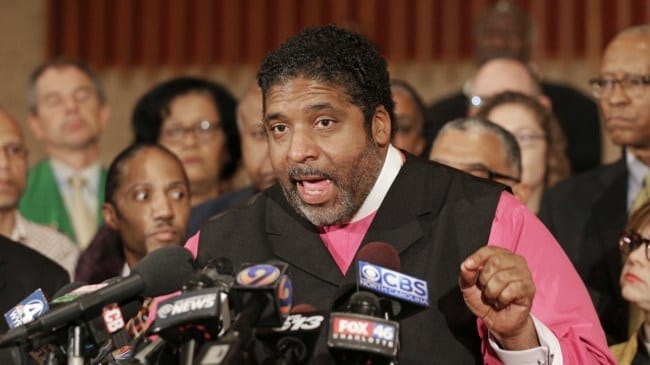
In this photo taken Thursday, Sept. 22, 2016, the Rev. William Barber speaks during a news conference after a second night of violence following the fatal police shooting of Keith Lamont Scott in Charlotte, N.C. Barber, who led the state NAACP as it successfully challenged North Carolina’s attempts to limit voting rights and took the organization deeper into support of gay rights, said Wednesday, May 10, 2017, that he won’t seek re-election as president of the state chapter. (AP Photo/Chuck Burton, File)
RALEIGH, N.C. (AP) — The Rev. William Barber, who led the state NAACP in blocking North Carolina’s attempts to limit voting rights and fiercely supported gay rights, said he’s stepping down as state chapter president and will focus on a poor people’s campaign like the Rev. Martin Luther King Jr. was building when he was slain.
Barber gained prominence in launching “Moral Monday” protests in North Carolina this decade and trained others in more than 20 states in such peaceful civil disobedience. But he said Wednesday that after 12 years as an NAACP state leader, he wants to focus on the new campaign and “a national call for a moral revival.”
“We need a moral narrative because somewhere along the line we’ve gotten trapped in this left vs. right conversation,” said the 53-year-old NAACP leader in an interview via conference call.
Barber also leads a nonprofit called Repairers of the Breach and said that group, along with the Kairos Center, Union Theological Seminary and others will lead a movement that will concentrate on 25 states and the nation’s capital where voter suppression, poverty and other problems are prevalent. The groups plan major actions next summer, which would mark the 50th anniversary of the start of King’s campaign in 1968.
Barber said more details would be forthcoming at a news conference Monday.
Though Barber’s term officially ends in October, he said he would step down in June. He will remain on the NAACP’s national board of directors, whose chair, Leon Russell, said he’ll “continue to be a voice for North Carolina, for the South and for issues he holds dear.”
Barber took the national stage in the literal sense last July, when he addressed the Democratic National Convention, saying then that the heart of the country’s democracy was on the line in the November elections. He called on voters to be “the moral defibrillator of our time” and to shock the nation with the power of love, mercy and the fight for justice.
Barber’s path to that stage began publicly when he was elected in 2005 to lead the state chapter of the NAACP, turning himself into a national leader fighting on progressive issues both on the streets and in the courts.
The minister of Greenleaf Christian Church in Goldsboro, Barber founded a movement called “Moral Mondays” during which more than 1,000 people were arrested for civil disobedience at North Carolina’s Legislature, including Barber on several occasions. Typically, the protesters rallied outside the legislative building, then moved to the legislative building, singing and holding up signs. Police warned them to leave before arrests began.
The protests were part of the broader Forward Together movement led by the NAACP, which won several protracted battles over voter access in the state.
Under Barber’s leadership, the NAACP fought the North Carolina law known as House Bill 2, the “bathroom bill” limiting rights for gay and transgender people that drew a national outcry, business boycotts and was subsequently modified under a political compromise.
The NAACP chapter also opposed North Carolina’s constitutional ban on gay marriage, which passed in 2012.
It was clear that the same people who opposed gay rights also supported bills such as voter identification, Barber said. “We refused to allow the extremists to isolate our position,” he said.
The various causes are parts of Barber’s vision for a country where like-minded people work together and not against each other.
“We need a narrative shift that’s … not just about the normal discussion of left vs. right and conservative vs. liberal, but really a reset of our deepest values,” he said. “Dr. King said in 1968 we needed a moral revolution of values, and we say we need a moral revival.”
___
Follow Martha Waggoner on Twitter @mjwaggonernc.
Copyright 2017 The Associated Press. All rights reserved. This material may not be published, broadcast, rewritten or redistributed.



